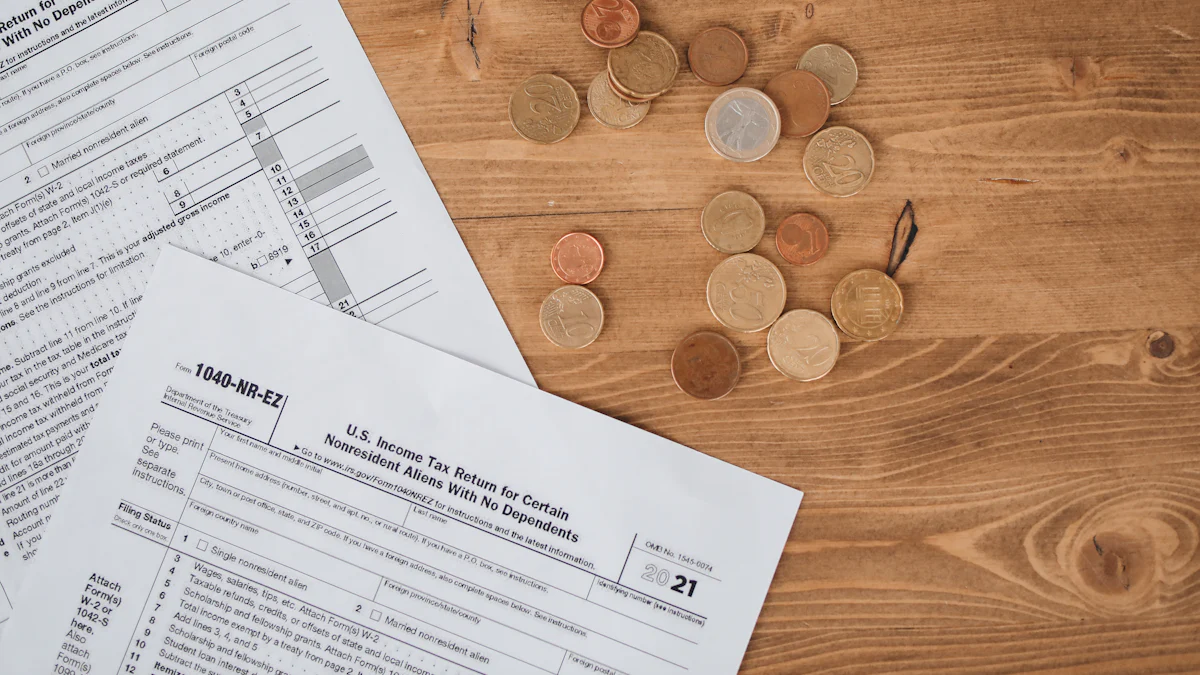Navigating HMRC Self Assessment for Landlords

Navigating the world of taxes can feel overwhelming, especially when you're a landlord. The HMRC Self Assessment is a crucial tool for landlords like you. It helps you report your rental income and expenses to HMRC. If you earn more than £1,000 from rental income, you must complete this Assessment. This process ensures you meet your tax obligations and avoid penalties. By understanding the HMRC Self Assessment, you can manage your tax responsibilities more effectively. It's not just about compliance; it's about keeping your finances in check.
Understanding HMRC Self Assessment
What is HMRC Self Assessment?
Definition and purpose
You might wonder what HMRC Self Assessment is all about. It's a system that allows you to report your income and expenses to HMRC. This process ensures you pay the right amount of tax. As a landlord, you need to declare all your rental income. The purpose is to keep your tax affairs in order and avoid any penalties. By using the HMRC app, you can easily manage your tax returns online.
Who needs to file?
Not everyone needs to file a Self Assessment. However, if you're a landlord earning more than £1,000 from rental income, you must file one. This requirement applies to anyone with additional income that isn't taxed at source. You should register for Self Assessment by October 5 following the tax year in which you received rental income. The HMRC app can help you keep track of these deadlines.
Why is it important for landlords?
Legal obligations
As a landlord, you have legal obligations to fulfill. Filing a Self Assessment tax return is one of them. You must report all taxable income, not just rental income. This includes any other earnings you might have. Failing to comply can lead to penalties and interest charges. The HMRC app provides guidance on what information you need to include in your return.
Financial implications
Understanding the financial implications is crucial. By accurately reporting your income and expenses, you can manage your finances better. You can also claim allowable expenses, such as maintenance and repairs, which reduce your taxable income. This process helps you avoid overpaying taxes. Using the HMRC app, you can ensure accuracy in your tax reporting and avoid unnecessary costs.
Preparing for Self Assessment

Getting ready for your HMRC Self Assessment involves gathering the right documents and understanding what you can claim as expenses. This preparation helps you accurately report your income and avoid any issues with your tax return.
Gathering Necessary Documents
To start, you need to collect all the essential documents related to your rental property. These documents form the backbone of your Self-Assessment process.
Rental Income Records
You must keep detailed records of your rental income. This includes all payments received from tenants. Accurate records ensure you report the correct amount to HM Revenue and Customs. Keeping track of your rental income helps you calculate your total taxable rental profit. This step is crucial for your tax return.
Expense Receipts
Collecting receipts for all your expenses is equally important. These receipts prove the costs you've incurred while managing your property. Expenses might include maintenance, repairs, and other costs related to your rental property. By keeping these receipts, you can claim allowable expenses and reduce your taxable income.
Understanding Allowable Expenses
Knowing which expenses you can claim is vital. It helps you lower your taxable income and manage your finances better. Here’s what you need to know about allowable expenses.
Maintenance and Repairs
You can claim expenses for maintenance and repairs on your rental property. These costs are necessary to keep your property in good condition. However, it's important to note that these expenses should not include capital expenses, which are improvements that add value to your property. Maintenance and repairs help you maintain your property without increasing its value.
Mortgage Interest
Mortgage interest is another allowable expense. You can deduct the interest portion of your mortgage payments from your rental income. This deduction reduces your taxable income and helps you manage your landlord tax obligations. Understanding these deductions is crucial for your HMRC Self Assessment.
Expert Testimony:
Landlord Tax Accountant: "Navigating the complex landscape of taxation can be a daunting task, especially for landlords who have multiple properties and various income streams. This is where the expertise of a Landlord Tax Accountant comes into play."
A Landlord Tax Accountant stays informed about the latest tax regulations. They can help you understand what expenses you can claim and ensure your tax return is accurate. Consulting with an accountant can save you time and prevent costly mistakes.
Completing the Self Assessment Form

Completing your Self-Assessment tax return might seem daunting, but breaking it down into steps can make it manageable. Let's walk through the process together.
Step-by-step guide
Registering with HMRC
First, you need to register with HMRC if you haven't already. This step is crucial for landlords who need to file a self-assessment tax return. You can do this online through the HMRC website. Once registered, you'll receive a Unique Taxpayer Reference (UTR) number. Keep this number safe; you'll need it every time you file your return. Registration ensures that HMRC recognizes you as a taxpayer, which is essential for managing your landlord tax obligations.
Filling out the form
After registration, it's time to fill out the Self-Assessment form. Start by gathering all necessary documents, including records of rental income and expenses related to your property. The form will ask for details about your income, including any rental income you received. Make sure to report all income accurately. You'll also need to list allowable expenses, such as maintenance and repairs on your property. These expenses can reduce your taxable income, so it's important to include them. Once you've completed the form, review it carefully to ensure accuracy before submission.
Common mistakes to avoid
Incorrect income reporting
One common mistake is incorrect income reporting. Double-check your figures to ensure that all rental income is reported accurately. Misreporting can lead to penalties and affect your tax return. Keep detailed records of all income and expenses to avoid errors. A Landlord Tax Accountant can help you verify your figures and ensure everything is in order.
Missing deadlines
Missing deadlines is another pitfall to avoid. The deadline for filing your Self-Assessment tax return is January 31st following the end of the tax year. Late submissions can result in penalties, so mark this date on your calendar. Set reminders to ensure you file on time. If you're unsure about deadlines or need assistance, consulting a Landlord Tax Accountant can be beneficial. They can help you stay on track and avoid costly mistakes.
By following these steps and avoiding common mistakes, you can complete your Self-Assessment tax return with confidence. Remember, managing your landlord tax responsibilities is not just about compliance; it's about keeping your finances in check and ensuring your property investments remain profitable.
Submitting the Self Assessment
Submitting your Self Assessment tax return online is a straightforward process. You’ll find it convenient and efficient, especially when you’re juggling multiple landlord tax responsibilities. Let’s break down the steps to ensure you’re on the right track.
Online submission process
Creating an online account
First things first, you need to create an online account with HMRC. This account is your gateway to managing your landlord tax obligations. Head over to the GOV.UK website and follow the instructions to set up your account. You’ll need your Unique Taxpayer Reference (UTR) number, which you received when you registered for Self Assessment. Once your account is ready, you can access all the tools you need to submit your tax return.
Submitting the form
With your account set up, it’s time to submit your tax return. Log in and navigate to the Self Assessment section. Here, you’ll enter details about your rental income and any allowable expenses. Make sure everything is accurate to avoid penalties. Double-check your figures, especially if you have multiple income sources. Once you’re confident everything is correct, hit submit. You’ll receive a confirmation, giving you peace of mind that your tax return is in HMRC’s hands.
Deadlines and penalties
Key dates to remember
Meeting deadlines is crucial to avoid penalties. The deadline for submitting your Self Assessment tax return online is January 31st following the end of the tax year. For example, for the 2022 to 2023 tax year, you must submit by January 31, 2024. Mark this date on your calendar and set reminders. Filing early gives you time to address any issues and ensures you know what you owe. It also helps you avoid the last-minute rush, reducing stress and potential errors.
Consequences of late submission
Missing the deadline can lead to penalties, which can quickly add up. If you file late, you’ll face an initial penalty of £100. Additional penalties apply if you delay further. Filing late also increases the chances of HMRC scrutiny, which can be stressful. To avoid penalties, make sure you submit your tax return on time. If you’re unsure about the process, consider consulting a Landlord Tax Accountant. They can guide you through the process and help you avoid costly mistakes.
By following these steps, you’ll submit your Self Assessment tax return with confidence. Remember, staying on top of your landlord tax responsibilities not only helps you avoid penalties but also keeps your finances in check. So, take action now and ensure your tax affairs are in order.
Addressing Potential Issues
As a landlord, you might face some challenges when dealing with HMRC inquiries. These inquiries can arise from discrepancies in your tax return or other issues related to your rental income. Let's explore how you can effectively address these potential issues and when it might be beneficial to seek professional help.
Dealing with HMRC inquiries
When HMRC reaches out with questions about your tax return, it's crucial to respond promptly and accurately. Here's how you can handle these inquiries:
Responding to queries
When you receive a query from HMRC, take it seriously. Review the details of the inquiry and gather all relevant documents related to your rental income and expenses. Responding accurately and promptly can prevent further complications. If you're unsure about how to respond, consider consulting a Landlord Tax Accountant. They can guide you through the process and ensure your response is accurate.
Providing additional information
Sometimes, HMRC may request additional information to clarify certain aspects of your tax return. Be prepared to provide detailed records of your rental income and any allowable expenses you've claimed. Keeping organized records throughout the year can make this process smoother. If you find yourself overwhelmed, a Landlord Tax Accountant can assist you in compiling and presenting the necessary information.
Tax Advisor Insight:
"Tax advisors can help navigate complex tax regulations and provide representation in negotiations with HMRC," says a seasoned Tax Advisor. They can also defend against various HMRC investigations, ensuring your interests are protected.
Seeking professional help
Navigating the complexities of landlord tax obligations can be daunting. Knowing when to seek professional assistance can save you time and stress.
When to consult a tax advisor
Consider consulting a tax advisor if you face an HMRC inquiry or if you're unsure about your tax return. A Landlord Tax Accountant can offer valuable insights into your specific situation. They can help you understand the nuances of rental income reporting and ensure compliance with tax regulations. Seeking advice early can prevent potential issues from escalating.
Benefits of professional assistance
Working with a Landlord Tax Accountant offers several benefits. They stay informed about the latest tax regulations and can help you maximize allowable deductions. Their expertise can also provide peace of mind, knowing your tax affairs are in order. Additionally, they can represent you in negotiations with HMRC, should any disputes arise.
KinsellaTax Representative:
"Always deal with HMRC investigations through a representative like KinsellaTax," advises a KinsellaTax Representative. Their expertise can be invaluable in navigating inquiries and ensuring a favorable outcome.
By addressing potential issues proactively and seeking professional help when needed, you can manage your landlord tax responsibilities more effectively. This approach not only helps you avoid penalties but also keeps your rental investments profitable and stress-free.
Navigating the world of landlord tax can seem daunting, but staying informed and proactive makes it manageable. Here's a quick recap:
Understand Your Obligations: Know what the HMRC Self Assessment entails and why it's crucial for landlords.
Organize Your Documents: Keep detailed records of rental income and expenses. This organization prevents mistakes and eases the filing process.
Avoid Common Pitfalls: Ensure accurate income reporting and meet deadlines to avoid penalties.
Financial Tip: Consult a Landlord Tax Accountant. They offer valuable insights and help you maximize deductions.
Remember, managing your landlord tax responsibilities isn't just about compliance. It's about maintaining your financial health and ensuring your investments remain profitable. A Landlord Tax Accountant can be your ally in this journey, providing guidance and peace of mind. Stay proactive, and you'll navigate the complexities of landlord tax with confidence.
See Also
Mastering Tax Implications When Selling Your Investment Property
Key Steps for Selling Your Occupied Property
Understanding Tenant Rights During Buy-to-Let Property Sale

